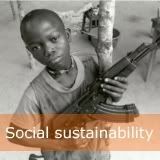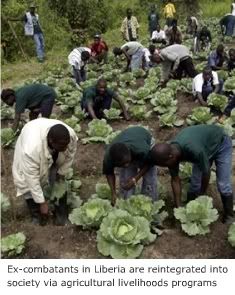Biofuels and social sustainability
 Discussions about the advantages and disadvantages of biofuels often tend to focus on environmental aspects only (on the one hand green fuels like ethanol and biodiesel can mitigate climate change, but on the other their cultivation opens questions about soil and water resources, biodiversity, deforestation and reforestation).
Discussions about the advantages and disadvantages of biofuels often tend to focus on environmental aspects only (on the one hand green fuels like ethanol and biodiesel can mitigate climate change, but on the other their cultivation opens questions about soil and water resources, biodiversity, deforestation and reforestation).Most often, the social aspects of this nascent energy sector are not taken into account at all. However, we think 'social sustainability' and even 'social justice' are just as important as 'environmental sustainability'. Both can be fused into a synergy in the biofuels industry.
The opportunity for social change that can be brought about by large-scale biofuel production should not be neglected: the sector promises to bring a large number of jobs to the rural poor (as we have tried to show in numerous articles about e.g. Indonesia, Brazil, China and Nigeria), it may generate stable incomes to farmers who are at the mercy of a volatile global market, it (re-)opens the debate about land reform, it makes apparent the issues of access to energy and of local energy security in rural areas, and it represents a new paradigm in which local resource control and 'bottom-up' decision making take central stage.
Perhaps the best illustration of this potential comes from biofuels superpower Brazil. In this country, Latin America's largest social movement, the Movimento de Trabalhadores Rurais sem Terra (MST) or Landless Workers' Movement, is actively being integrated into society by way of the biofuels opportunity. During his first term, President Lula has been trying to solve the age-old problem of Brazil's rural poverty and of its tens of thousands of landless people. He thinks biofuels might offer a way out. "I have always believed that biodiesel might solve the problem of small and landless farmers". Lula's aim now is to strengthen the rural and land reforms that he initiated by tieing them to an ambitious biodiesel program ('Probiodiesel') - and to speed up both.
Another very tangible example comes from the state of Andhra Pradesh in India. Here, many of the poorest peasants have formed so-called 'Naxalite' groups who fight for social justice. The Naxalites, who have been around for decades, use a marxist-leninist or maoist discourse and have taken up the armed struggle against the local, state, and national governments. They feel structurally left out of the country's rising prosperity, and since they are the poorest farmers who live on marginal, fringe lands, they don't have much opportunity to lift themselves out of poverty. As inequality in the country grows, the Naxalites feel increasingly alienated, and consequently resort to ever more violent and desperate campaigns. Far from seeing it as a magical solution to all social problems, the Andhra Pradesh government does take the biofuel opportunity serious and has launched a massive planting campaign on Naxalite lands, with the aim of turning the tide. The marginal lands are suitable for not much else than pongamia and jatropha shrubs - but these biodiesel crops are now seen as green gold. There are some signs that Naxalite farmers agree that a win-win situation is in the make: they might obtain income security through biofuel farming, whereas the government hails their reintegration into society as part of a national security strategy:
 ethanol :: biodiesel :: biomass :: bioenergy :: biofuels :: energy :: social development :: poverty :: social sustainability ::
ethanol :: biodiesel :: biomass :: bioenergy :: biofuels :: energy :: social development :: poverty :: social sustainability :: Finally, biofuel production may become part of post-conflict strategies focused on reintegrating ex-combatants and rebels, by making them part of viable agricultural projects. The technique of giving ex-combatants land and the means of production to develop sustainable livelihoods, which prevents them from re-joining armed groups and factions, is well tested. In such diverse countries as Liberia, Sudan, Sierra Leone or Congo, where the social fabric has become very fragile after years of civil war and where ex-combatants are continuously tempted to take up arms again because of a lack of employment opportunities, biofuel plantations and production may play an important role as stabilizing factor, because of its local rootedness and because of the job creation potential it offers.
Finally, biofuel production may become part of post-conflict strategies focused on reintegrating ex-combatants and rebels, by making them part of viable agricultural projects. The technique of giving ex-combatants land and the means of production to develop sustainable livelihoods, which prevents them from re-joining armed groups and factions, is well tested. In such diverse countries as Liberia, Sudan, Sierra Leone or Congo, where the social fabric has become very fragile after years of civil war and where ex-combatants are continuously tempted to take up arms again because of a lack of employment opportunities, biofuel plantations and production may play an important role as stabilizing factor, because of its local rootedness and because of the job creation potential it offers.We will be exploring the concept of 'social sustainability' and its role in the biofuels sector more often and more in depth in future articles [entry ends here].
 -------------------
-------------------
 Spanish company Ferry Group is to invest €42/US$55.2 million in a project for the production of biomass fuel pellets in Bulgaria.
The 3-year project consists of establishing plantations of paulownia trees near the city of Tran. Paulownia is a fast-growing tree used for the commercial production of fuel pellets.
Spanish company Ferry Group is to invest €42/US$55.2 million in a project for the production of biomass fuel pellets in Bulgaria.
The 3-year project consists of establishing plantations of paulownia trees near the city of Tran. Paulownia is a fast-growing tree used for the commercial production of fuel pellets.









0 Comments:
Post a Comment
Links to this post:
Create a Link
<< Home